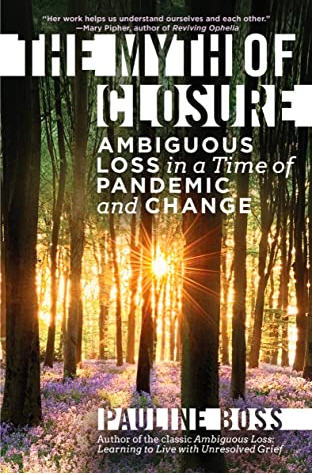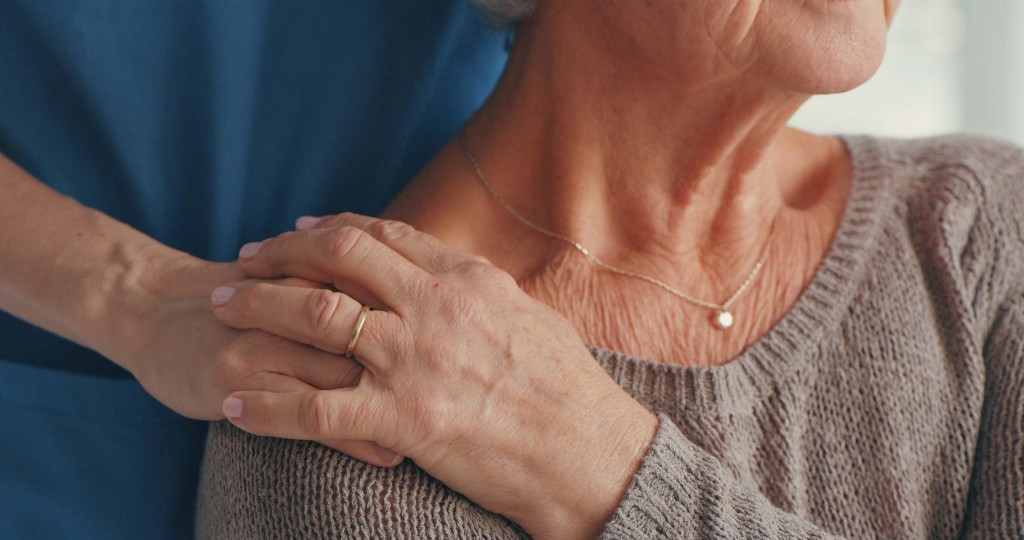Dealing with Grief and the Myth of Closure


 Pauline Boss, PhD, is an expert on loss and grief. In the 1970s she coined the term “ambiguous loss” in the course of researching the grief suffered by people whose loved ones are missing but not declared dead. She has published 8 books that have been translated into 17 languages and she has been a visiting professor at Harvard Medical School and the University of Southern California.
Pauline Boss, PhD, is an expert on loss and grief. In the 1970s she coined the term “ambiguous loss” in the course of researching the grief suffered by people whose loved ones are missing but not declared dead. She has published 8 books that have been translated into 17 languages and she has been a visiting professor at Harvard Medical School and the University of Southern California.
Her new book, The Myth of Closure: Ambiguous Loss in a Time of Pandemic and Change, was written to help us all deal with the losses we’ve suffered during the COVID-19 pandemic and the Black Lives Matter struggles. In her preface she writes, “Many media personalities and journalists use the term ‘closure’ as the essential feel-good ending to a painful story—satisfying perhaps for their viewers or readers, but not for people who know from experience that closure is a myth.” She goes on to say, “Research shows that we do better to live with grief than to deny it or close the door on it. Our task now, after a time of so much suffering, is to acknowledge our losses, name them, find meaning in them, and let go of the quest for closure.”
So how do we do that? Dr. Boss suggests we adopt these strategies:
 > Live with loss and still have a good life – We need to identify what we have lost, whether clear or ambiguous, and allow ourselves the time and space to grieve those losses. Whether those losses were seemingly small (the loss of being able to go to the gym or out to lunch with friends) or large (the loss of many black lives at the hands of the police) they need to be acknowledged.
> Live with loss and still have a good life – We need to identify what we have lost, whether clear or ambiguous, and allow ourselves the time and space to grieve those losses. Whether those losses were seemingly small (the loss of being able to go to the gym or out to lunch with friends) or large (the loss of many black lives at the hands of the police) they need to be acknowledged.
> Understand the cross-generational trauma that comes from racism – The murder of George Floyd by a Minneapolis police officer brought to light the unresolved cruelty and losses from slavery and the systemic racism that is still with us today. Boss writes, “Losses never acknowledged remain ambiguous and unresolved, so the trauma is passed down across the generations and can erupt years later.” Once we all see these problems more clearly, we can work on changes and begin to heal.
> Practice resilience – Resilience is the ability to be flexible in the face of pressure without breaking down. Dr. Boss gives us 6 guidelines for building resilience. They can be used in any order as needed.
1. Find Meaning – Ask yourself, “What does this loss mean to me?” Dr. Boss notes, “finding meaning and purpose in tragedy makes that tragedy easier to bear. That’s resilience.” She writes, “The meaning of living through a pandemic, for me, is that we are not always in charge, that we can’t always have our way, and that we actually can endure suffering, not only to survive, but to discover that we have even gained more empathy for the plight of others.”
Find Meaning – Ask yourself, “What does this loss mean to me?” Dr. Boss notes, “finding meaning and purpose in tragedy makes that tragedy easier to bear. That’s resilience.” She writes, “The meaning of living through a pandemic, for me, is that we are not always in charge, that we can’t always have our way, and that we actually can endure suffering, not only to survive, but to discover that we have even gained more empathy for the plight of others.”
2. Adjust Mastery – Being able to manage and solve problems is consistently shown to ease stress and trauma. But grief is not something that can be controlled. Grief is meant to be expressed and lived with.
3. Reconstruct Identity – Children grow up. Parents die. Our mates die. Over a lifetime loss and change accumulate so we must be malleable enough to grow and shift who we are and what we do.
4. Normalize Ambivalence – Whether we are actively involved in politics or at home caring for a child or a frail elder, it is normal to have some ambivalent feelings about how to act, what to do, what to believe. We must also be aware, however, that hesitation can lead to inaction and thus decrease our personal agency to better our situation. We have to make the best decisions possible even though they may not be perfect.
 5. Revise Attachment – Given the grim numbers of global pandemic deaths, we need patience and empathy now for the millions of families who are grieving. And if we are the bereaved, we need more patience with ourselves. Don’t accept the idea of closure, but rather, slowly begin to revise your attachment to the person who died. The task is to let go of the person we lost but keep them present in our heart and mind as we gradually rebuild our lives in new ways.
5. Revise Attachment – Given the grim numbers of global pandemic deaths, we need patience and empathy now for the millions of families who are grieving. And if we are the bereaved, we need more patience with ourselves. Don’t accept the idea of closure, but rather, slowly begin to revise your attachment to the person who died. The task is to let go of the person we lost but keep them present in our heart and mind as we gradually rebuild our lives in new ways.
6. Discover New Hope – In this time of upheaval, we can’t just hang on to the outcome we want. That’s harmful to ourselves and others who depend on us. Instead of obsessively hoping for life to return to what it was, we have to hope for something new. Imagine what life could be like if you are willing to risk change. Hope for something new and purposeful that will sustain you and give you joy for the rest of your life.
The COVID-19 pandemic has forced change on all of us. But change is sometimes necessary and positive. No matter our age, we can change and evolve and become more resilient than we were before. As Dr. Boss says, “May you find the resilience to search for meaning instead of closure, and may you find peace in the sadness of your own losses.”